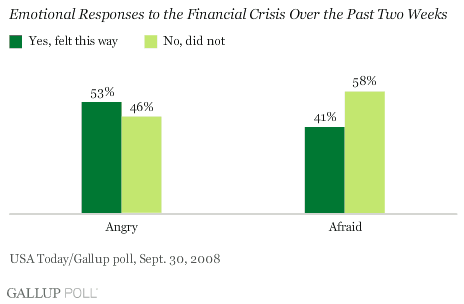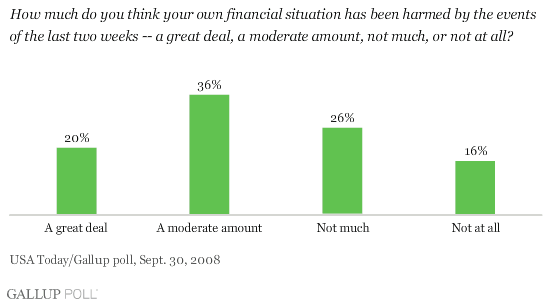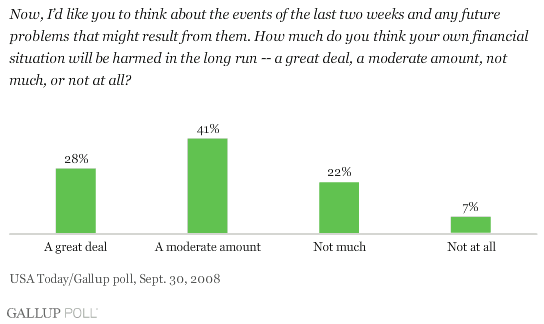PRINCETON, NJ -- A USA Today/Gallup poll finds 53% of Americans describing themselves as "angry" about the financial crisis that has gripped the nation the past two weeks. Fewer Americans, but still a substantial 41%, say the recent events have made them feel "afraid."

These results are based on a one-night USA Today/Gallup reaction poll conducted Sept. 30, the night after the U.S. House rejected the proposed $700 billion plan to deal with the growing financial crisis.
Feelings of anger are more prevalent among Americans of higher socioeconomic status -- 63% of college graduates say they have felt anger over the recent events in the financial world, compared with 50% of non-graduates (and only 43% of those who have not attended college).
Similarly, 62% of respondents in upper-income households (with annual incomes of $60,000 or more) have been angry, compared with 50% of those in lower-income households.
Fear has not been as common an emotion as anger in response to the financial crisis, and subgroup differences in expressed fear tend to be rather modest. For example, 46% of college graduates say they have felt afraid because of the recent economic problems, compared with 39% of non-graduates.
The poll does find that women (49%) are significantly more likely than men (32%) to say they have felt afraid as a result of the economic problems, but it is unclear whether this reflects a real difference in response to the events or a typical pattern in poll results by which men appear more reluctant than women to express fear.
Anger and fear are not surprising reactions given that most Americans already report some harm to their own finances, and an even higher number expect their finances to be affected in the long term.
According to the poll, 56% of Americans say their finances have already been harmed "a great deal" (20%) or "a moderate amount" (36%) by the events of the last two weeks. Only 16% say their own financial situations have not been harmed at all.

Looking long-term, an even higher 69% of Americans expect their finances to be harmed by the recent events, as well as any future problems that result from them. Only 7% expect to totally avoid any repercussions.

Upper-income Americans (56%) are only slightly more likely than lower-income Americans (52%) to say their finances have already been harmed by the recent events on Wall Street. And while both groups are more likely to expect harm to their financial situations in the long run than in the short term, they are about equally likely to do so (70% of upper-income Americans and 69% of lower-income Americans).
Thus far, 63% of college graduates say their finances have been harmed by the events of the last two weeks, compared with 52% of non-graduates. But both groups are about equally likely to expect harm in the long run (71% and 67%, respectively).
Survey Methods
Results are based on telephone interviews with 1,021 national adults, aged 18 and older, conducted Sept. 30, 2008. For results based on the total sample of national adults, one can say with 95% confidence that the maximum margin of sampling error is ±3 percentage points.
Interviews are conducted with respondents on land-line telephones (for respondents with a land-line telephone) and cellular phones (for respondents who are cell-phone only).
In addition to sampling error, question wording and practical difficulties in conducting surveys can introduce error or bias into the findings of public opinion polls. Polls conducted entirely in one day, such as this one, are subject to additional error or bias not found in polls conducted over several days.
